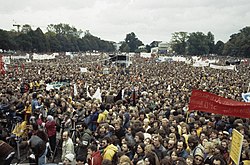Prior to 19th century
| History of Germany |
|---|
 |
- 70 CE - Roman-Batavian conflict. [1]
- 359 CE - Town of the Ubii restored by the emperor Julian. [1]
- 889 CE - Settlement sacked by Norse raiders. [1]
- 1151 - Doppelkirche Schwarzrheindorf consecrated.
- 13th C. - Bonn Minster (church) built. [1]
- 1318 - Minoretenkirche (church) built. [1]
- 1543 - Printing press in operation. [2]
- 1597 - Bonn becomes capital of the Electorate of Cologne.[ citation needed ]
- 1627 - Kreuzbergkirche (Bonn) (church) built.
- 1673 - November: Siege of Bonn.
- 1693 - Jesuiten-kirche (church) built. [1]
- 1730 - Palace built. [3]
- 1737 - Town Hall built. [3]
- 1746 - Poppelsdorf Palace built.
- 1770 - Ludwig van Beethoven born in Bonn. [1]
- 1777 - Kurkölnische Akademie Bonn (academy) founded..
- 1792 - Beethoven leaves Bonn for Vienna where he would stay for the rest of his life.
- 1793 - N. Simrock music publisher in business. [4]
- 1794 - French took power; sanctioned by the Treaty of Lunéville. [1]
- 1800 - Johann Joseph Eichhoff becomes mayor.


